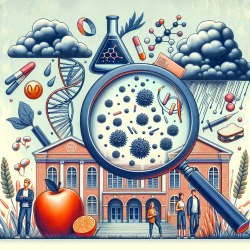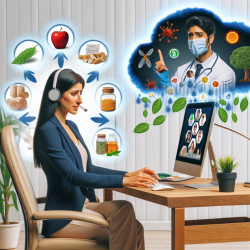Introduction
The intersection of mental health and microbiome research has unveiled intriguing insights, particularly concerning the role of the oral microbiome in mental health outcomes. A recent study titled "Saliva microbiome, dietary, and genetic markers are associated with suicidal ideation in university students" has shed light on potential biomarkers for suicidal ideation (SI) among young adults. This blog post explores the study's findings and discusses how practitioners can leverage these insights to improve mental health outcomes.
Study Overview
The study involved 489 university students, examining the relationship between saliva microbiome composition, dietary habits, genetic markers, and SI. The researchers identified specific bacterial taxa and genetic markers associated with increased or decreased SI risk, highlighting the complex interplay between genetics, diet, and microbiome in mental health.
Key Findings
- Microbial Associations: Certain bacterial taxa, such as Alloprevotella rava and Prevotella melaninogenica, were found to be correlated with SI. Notably, the absence of Alloprevotella rava was linked to increased SI risk, suggesting its potential protective role.
- Genetic Markers: The study identified specific HLA alleles, such as DRB1*04, that were protective against SI, while others increased SI risk. The presence of the rs10437629 SNP was also associated with higher SI incidence.
- Dietary Influences: Regular consumption of nuts and adherence to a Mediterranean diet were inversely correlated with SI, emphasizing the role of diet in mental health.
Implications for Practitioners
Practitioners in speech-language pathology and related fields can utilize these findings to enhance mental health interventions. Here are some actionable steps:
- Integrate Dietary Counseling: Encourage dietary habits that support a healthy microbiome, such as increased intake of nuts and adherence to a Mediterranean diet.
- Consider Genetic Screening: Genetic markers like HLA alleles and specific SNPs can inform personalized interventions for individuals at risk of SI.
- Monitor Microbiome Health: Regular assessment of oral microbiome composition can provide early indicators of mental health risks, allowing for timely interventions.
Encouraging Further Research
While this study provides valuable insights, further research is necessary to fully understand the mechanisms underlying the microbiome-mental health connection. Practitioners are encouraged to collaborate with researchers to explore these relationships further and develop evidence-based interventions.
Conclusion
The integration of microbiome research into mental health practices offers promising avenues for improving outcomes for individuals at risk of SI. By leveraging dietary, genetic, and microbiome insights, practitioners can develop more holistic and personalized approaches to mental health care.
To read the original research paper, please follow this link: Saliva microbiome, dietary, and genetic markers are associated with suicidal ideation in university students.










